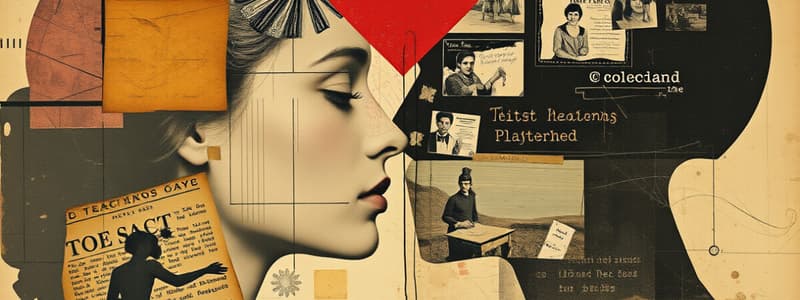Podcast
Questions and Answers
What characterizes platonic love?
What characterizes platonic love?
- Intense emotional attachment and desire
- Bonds between family members
- Recognition of one’s own worth
- Affectionate relationship without sexual attraction (correct)
Which of the following is NOT one of the three components of the Triangular Theory of Love?
Which of the following is NOT one of the three components of the Triangular Theory of Love?
- Passion
- Intimacy
- Commitment
- Compassion (correct)
What phase follows the initial attraction in the stages of love?
What phase follows the initial attraction in the stages of love?
- Familial Love
- Enduring Love
- Companionate Love
- Romantic Love (correct)
Which attachment style is characterized by avoidance of closeness and difficulty expressing emotions?
Which attachment style is characterized by avoidance of closeness and difficulty expressing emotions?
How do collectivist societies typically view love compared to individualist societies?
How do collectivist societies typically view love compared to individualist societies?
Which love language involves expressing love through verbal compliments and words of encouragement?
Which love language involves expressing love through verbal compliments and words of encouragement?
What hormone is primarily associated with bonding in relationships?
What hormone is primarily associated with bonding in relationships?
What is the primary focus of the Duo Theory of Love?
What is the primary focus of the Duo Theory of Love?
Flashcards are hidden until you start studying
Study Notes
Definitions of Love
- Romantic Love: Intense emotional attachment, often involving passion and desire.
- Platonic Love: Affectionate relationship without sexual attraction; deep friendship.
- Familial Love: Bonds between family members, characterized by loyalty and care.
- Self-Love: Recognition and appreciation of one’s own worth and well-being.
Theories of Love
-
Triangular Theory of Love (Sternberg):
- Intimacy: Emotional closeness and connection.
- Passion: Physical attraction and sexual desire.
- Commitment: Decision to maintain a long-term relationship.
-
Attachment Theory:
- Influences how people form emotional bonds based on early relationships with caregivers.
- Types: Secure, anxious, avoidant, and disorganized attachment styles.
-
Duo Theory:
- Focuses on two main components: Connection and Care.
Stages of Love
- Attraction: Initial phase characterized by physical attraction and infatuation.
- Romantic Love: Deepening emotional connection, often accompanied by passion.
- Companionate Love: Development of a strong bond based on mutual respect and commitment.
- Enduring Love: Sustained love over time, often incorporating friendship and shared goals.
Psychological Aspects
- Love can influence mental health positively (e.g., increased happiness) or negatively (e.g., stress from unrequited love).
- Hormones involved include oxytocin (bonding), dopamine (pleasure), and serotonin (mood regulation).
Cultural Variations
- Different cultures have unique expressions and understandings of love.
- Collectivist vs. individualist societies may prioritize familial obligations over romantic relationships or vice versa.
Love Languages
- Five primary love languages that describe how individuals express and receive love:
- Words of Affirmation
- Acts of Service
- Receiving Gifts
- Quality Time
- Physical Touch
Love in Literature and Art
- Frequently explored theme in poetry, novels, and visual arts.
- Often depicted as a driving force behind human actions and decisions.
Love and Relationships
- Healthy relationships are built on trust, communication, and mutual respect.
- Conflict resolution plays a critical role in maintaining long-term love.
Challenges of Love
- Jealousy, insecurity, and misunderstandings can undermine relationships.
- External factors such as stress, societal pressure, and life changes can impact love.
Conclusion
- Love is a complex and multifaceted emotion that influences human behavior across various domains.
- Understanding its various forms and implications can enhance personal relationships and emotional well-being.
Definitions of Love
- Romantic Love: Characterized by intense emotional attachment with passion and desire.
- Platonic Love: Deep friendship without sexual attraction, focusing on emotional closeness.
- Familial Love: Strong bonds between family members, defined by loyalty, care, and support.
- Self-Love: Essential recognition and appreciation of personal worth and well-being.
Theories of Love
- Triangular Theory of Love (Sternberg):
- Comprises three components: intimacy (emotional closeness), passion (physical attraction), and commitment (dedication to a long-term relationship).
- Attachment Theory:
- Describes how early caregiver relationships shape emotional bonds; includes secure, anxious, avoidant, and disorganized attachment styles.
- Duo Theory:
- Centers on two key aspects: connection and care in relationships.
Stages of Love
- Attraction: The initial phase marked by physical allure and infatuation.
- Romantic Love: Growth of emotional connection, typically accompanied by heightened passion.
- Companionate Love: Formation of strong bonds based on respect and commitment.
- Enduring Love: Long-lasting love that incorporates friendship and shared life goals.
Psychological Aspects
- Love impacts mental health positively, enhancing happiness, or negatively, causing stress from unreciprocated feelings.
- Key hormones involved are oxytocin (for bonding), dopamine (for pleasure), and serotonin (for mood stabilization).
Cultural Variations
- Expressions and interpretations of love vary widely across cultures.
- Collectivist cultures may prioritize familial ties over romantic ones, while individualist societies may focus on personal romantic relationships.
Love Languages
- Five essential love languages explain how individuals express and receive love:
- Words of Affirmation: Verbal expressions of affection and encouragement.
- Acts of Service: Actions taken to benefit and support loved ones.
- Receiving Gifts: Tangible tokens of love and appreciation.
- Quality Time: Focusing undivided attention on loved ones.
- Physical Touch: Use of physical closeness and intimacy to convey love.
Love in Literature and Art
- A prevalent theme in poetry, novels, and visual arts; often depicted as a primary motivator of human actions and decisions.
Love and Relationships
- Healthy relationships are founded on trust, effective communication, and mutual respect.
- Conflict resolution strategies are crucial for sustaining long-term love.
Challenges of Love
- Relationship challenges include jealousy, insecurity, and communication breakdowns.
- External stressors such as societal pressure and life transitions can strain romantic connections.
Conclusion
- Love is a complex emotion that significantly influences human behavior and relationships.
- Understanding different forms of love fosters better personal relationships and emotional health.
Studying That Suits You
Use AI to generate personalized quizzes and flashcards to suit your learning preferences.




